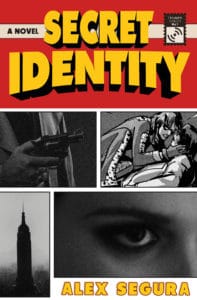So you want to write comics.
Congrats, that’s the easy part.
I hear this often, to varying degrees, from colleagues of mine in the prose space. It’s usually a version of “I have this idea, but I don’t have the time to write it as a novel – maybe it could be a comic?” or “I had this screenplay that went nowhere, maybe I can just make it into a comic?”
I’m not saying these questions are bad, per se. Well-intentioned, sure, but somewhat ignorant to the process. And they both overlap in making it seem like creating a comic is somehow easier than writing a novel, or screenplay. The truth is, it’s not. It’s just very different.
As you probably know, my latest crime novel, Secret Identity, explores the comic book industry of a lost era – the 1970s. Particularly the industry in New York City, through the eyes of my protagonist, Cuban-American Carmen Valdez. Carmen moves to the big city to pursue her dream of writing comics, even snagging a secretarial job at third-rate publisher Triumph Comics. But the path to creating comics is blocked by her own boss, who makes it clear that he won’t humor Carmen’s pitches or ideas anymore. When she’s approached by her work colleague Harvey, a junior editor at Triumph, to collaborate on the company’s first female superhero, she’s intrigued. The only catch? Carmen’s contribution has to be anonymous. Despite the red flags, Carmen does the work – and their creation, The Legendary Lynx, is a huge hit. The only problem? Harvey’s been murdered, and no one knows Carmen helped create the company’s biggest hit. This spurs Carmen into the role of amateur sleuth – to not only figure out what happened to her friend, but to reclaim the character that meant so much to her.
The book is a product of my dual careers and passions – mystery novelist and comic book editor/writer/marketing person. Like Carmen, I grew up reading and loving comics – the stories, the creators, and eventually, the industry itself. So when Hank asked me to swing by and talk a little shop, I felt like I’d share a few tips for my fellow novelists looking to make the plunge:
Collaboration over Isolation
Writing novels, even when you engage in notes from your editor, agent, or writers group, is a solitary endeavor. You are the sole decider on things and you control every aspect of the mental picture – camera angles, details, scene shifts. It’s all yours. It’s the peak of control. If you like that, and if you don’t want to give up any control in the creative process – comics might not be for you. Creating comics – writing comics – is like playing rhythm guitar in a band. You’re one part of a greater whole that is hopefully made better by all the parts. To shift to a movie metaphor, you’re the screenwriter. The artist, who is spending hours creating and crafting the visuals of your script, is akin to the director – and you have to let go enough to allow them to really stretch their creative muscles and present your story in a way that they think is best. And believe me – the artist knows best. So be ready to give away parts of your story to make the final product better, and make sure you’re giving the artist stuff they want to draw. It’s not a one-person show anymore, but the finished book will be much cooler for it.
Think Visually
Comics are a visual medium, full stop. The onus of describing everything is no longer on your shoulders, even as the writer. In fact, writing a comic book script is more akin to putting a puzzle together than writing a novel or short story. For example – you can only have so many panels on a page. You can only have one “action” per panel (think about it. You can’t show someone jumping and then punching – it’s a snapshot of time, not a clip). In that panel, you can only have so many word balloons or captions. And those balloons and captions can only hold so many words. The long and short of it? Lean on your artist. Let them show what you don’t need to tell. You don’t have to type “he smirked.” Why? Because, ideally, your artist is already showing that. When you’re scripting, describe what you want the artist to show – then use your words in the captions and dialogue to complement and clarify. Comics lean more on dialogue and inner monologue versus pure description. Why? Well, it’s already on the page if you’re doing it right.
Pace Yourself
Like I said before – comics are a puzzle. If you’re writing a single issue, you have 20-22 pages to tell a story. Even if that story is part of a bigger arc (which will, ideally, be collected into a trade paperback or “graphic novel”), it has to mean something. Someone is spending around five bucks to read the issue. That means it needs a beginning, middle, and end. I always suggest new writers write a page breakdown, where you literally explain and list what happens on each page, as a first draft primer before diving into the script. That way, your script builds off an existing structure instead of flying blind. It saves a ton of headaches.
Okay, then what?
I could write a book about putting a comic together – and what comes before and after – but the main thing you need is an idea. Then you need an artist (ideally one who will share ownership!). Then you need a script. But you also need a pitch. What’s a pitch? It’s exactly that – a document that outlines your concept, shows some art, and pitches it to an editor. That’s a journey unto itself, akin to shopping your novel around. I teach a class at LitReactor called Splash Page that covers this very topic from idea to actually pitching the comic itself. I’ll be teaching a few sessions in the coming months, so it’d be great to have you.
In closing – comics are tough. It’s a different writerly muscle. But it’s also a fascinating, engrossing medium with a long, meaningful history in pop culture and literature. I hope this primer helps you start your journey. Good luck!
Do you love comics? Ever think about writing them? Any questions? Let’s talk about it on the Career Authors Facebook page!

Alex Segura is an acclaimed and award-winning writer of novels, comics, short stories, and more. His latest crime novel, Secret Identity, is out now from Flatiron Books.





